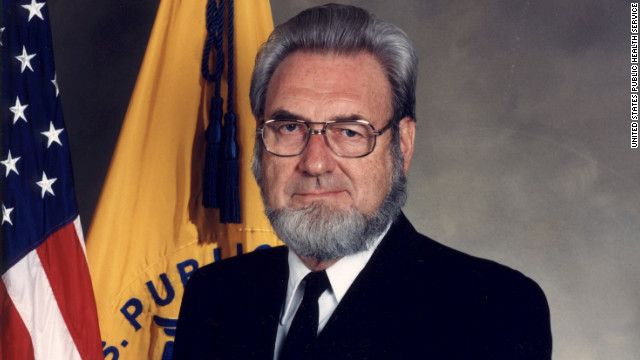前美国公共卫生署署长C. Everett Koop医生逝世,享年96岁

C. Everett Koop, MD, the former US Surgeon General who attacked tobacco use and personally educated the nation on HIV/AIDS during the first decade of the outbreak, died today at his home. He was 96 years old.
His death was announced by the Geisel School of Medicine at Dartmouth University, home to the C. Everett Koop Institute.
Serving as the nation's top physician under President Ronald Reagan from November 1981 through October 1989, Dr. Koop cut a sharp public figure as much with his trademark bow-tie and Lincoln-esque beard as with his outspokenness on public health issues. He revved up the federal government's campaign against tobacco use with a 1988 Surgeon General's report titled "The Health Consequences of Smoking: Nicotine Addiction." He called for a "smoke-free society" by the year 2000.
However, Dr. Koop may be best remembered as the government's first spokesperson on HIV/AIDS, which at the time was ravaging society with no adequate treatment in sight. At the behest of Reagan, Dr. Koop wrote a 36-page report on HIV/AIDS that, according to his biography at the Web site of the Surgeon General's office, "contributed significantly to providing accurate, comprehensive information on this frightening disease" that was "explicit, non-judgmental, controversial, and popular."
Koop went one step further and wrote a condensed, 8-page version of the report that was mailed to 107 million households in the country. The National Library of Medicine has described it as "the largest mailing in American history and the first time that the federal government provided explicit sex information to the public."
"Dr. Koop's leadership in HIV/AIDS has a lot to do with why he is the only surgeon general who most Americans remember," said Michael Gottlieb, MD, coauthor of the first published report on AIDS and cofounder of the American Foundation for AIDS Research. "Dr. Koop understood the gravity of HIV/AIDS, and that people needed information from the highest level of government. He had the guts and standing in the profession to break ranks with the Reagan administration's do-nothing approach.
"His mailer explaining HIV/AIDS in both English and Spanish to every household in America broke a long and painful silence," Dr. Gottlieb told Medscape Medical News. "It was a landmark event in the epidemic."
Other issues that Dr. Koop spotlighted as Surgeon General included organ transplantation, diet and nutrition, and the benefits of physical activity.
"A Pioneering Pediatric Surgeon"
Born in Brooklyn, New York, Dr. Koop earned his medical degree from Cornell Medical School in 1941 and went on to specialize in pediatric surgery. From 1948 to 1981, he was surgeon-in-chief at the Children's Hospital in Philadelphia, where he established the nation's first neonatal intensive care nursery. He helped to create the American Academy of Pediatric Surgeons and its journal, which he edited for 11 years.
In 1992, Dr. Koop founded the institute bearing his name at Dartmouth University, where he had received an undergraduate degree in zoology. In addition to serving as the institute's senior scholar, he was a professor of surgery at the Geisel School of Medicine.
In 1995, President Bill Clinton awarded Dr. Koop the Presidential Medal of Freedom, the nation's highest civilian honor.
"Dr. Koop was not only a pioneering pediatric surgeon but also one of the most courageous and passionate public health advocates of the past century," noted Wiley Souba, MD, dean of the Geisel School of Medicine, in a press release. "He did not back down from deeply rooted health challenges or powerful interests that stood in the way of needed change.
"Instead, he fought, he educated, and he transformed lives for the better."